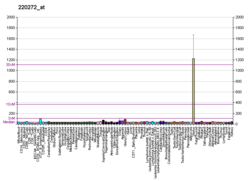Zinc finger protein basonuclin-2
Zinc finger protein basonuclin-2 is a protein that in humans is encoded by the BNC2 gene.[5][6] BCN2 has recently been shown to influence skin pigmentation levels in Europeans.[7] Genomic region spanning the BCN2 gene has 60% Neanderthal DNA sequence.[8]
See also
- Chromosome 9 (human)
- Zinc finger protein
References
- GRCh38: Ensembl release 89: ENSG00000173068 - Ensembl, May 2017
- GRCm38: Ensembl release 89: ENSMUSG00000028487 - Ensembl, May 2017
- "Human PubMed Reference:". National Center for Biotechnology Information, U.S. National Library of Medicine.
- "Mouse PubMed Reference:". National Center for Biotechnology Information, U.S. National Library of Medicine.
- Ota T, Suzuki Y, Nishikawa T, Otsuki T, Sugiyama T, Irie R, et al. (Jan 2004). "Complete sequencing and characterization of 21,243 full-length human cDNAs". Nature Genetics. 36 (1): 40–5. doi:10.1038/ng1285. PMID 14702039.
- "Entrez Gene: BNC2 basonuclin 2".
- Jacobs LC, Wollstein A, Lao O, Hofman A, Klaver CC, Uitterlinden AG, Nijsten T, Kayser M, Liu F (Feb 2013). "Comprehensive candidate gene study highlights UGT1A and BNC2 as new genes determining continuous skin color variation in Europeans". Human Genetics. 132 (2): 147–58. doi:10.1007/s00439-012-1232-9. PMID 23052946.
- Vattathil S, Akey JM (Oct 2015). "Small Amounts of Archaic Admixture Provide Big Insights into Human History". Cell. 163 (2): 281–4. doi:10.1016/j.cell.2015.09.042. PMID 26451479.
Further reading
- Vanhoutteghem A, Djian P (Jan 2007). "The human basonuclin 2 gene has the potential to generate nearly 90,000 mRNA isoforms encoding over 2000 different proteins". Genomics. 89 (1): 44–58. doi:10.1016/j.ygeno.2006.07.006. PMID 16942855.
- Vanhoutteghem A, Djian P (Aug 2006). "Basonuclins 1 and 2, whose genes share a common origin, are proteins with widely different properties and functions". Proceedings of the National Academy of Sciences of the United States of America. 103 (33): 12423–8. doi:10.1073/pnas.0605086103. PMC 1567895. PMID 16891417.
- Kimura K, Wakamatsu A, Suzuki Y, Ota T, Nishikawa T, Yamashita R, Yamamoto J, Sekine M, Tsuritani K, Wakaguri H, Ishii S, Sugiyama T, Saito K, Isono Y, Irie R, Kushida N, Yoneyama T, Otsuka R, Kanda K, Yokoi T, Kondo H, Wagatsuma M, Murakawa K, Ishida S, Ishibashi T, Takahashi-Fujii A, Tanase T, Nagai K, Kikuchi H, Nakai K, Isogai T, Sugano S (Jan 2006). "Diversification of transcriptional modulation: large-scale identification and characterization of putative alternative promoters of human genes". Genome Research. 16 (1): 55–65. doi:10.1101/gr.4039406. PMC 1356129. PMID 16344560.
- Benevolenskaya EV, Murray HL, Branton P, Young RA, Kaelin WG (Jun 2005). "Binding of pRB to the PHD protein RBP2 promotes cellular differentiation". Molecular Cell. 18 (6): 623–35. doi:10.1016/j.molcel.2005.05.012. PMID 15949438.
- Romano RA, Li H, Tummala R, Maul R, Sinha S (May 2004). "Identification of Basonuclin2, a DNA-binding zinc-finger protein expressed in germ tissues and skin keratinocytes". Genomics. 83 (5): 821–33. doi:10.1016/j.ygeno.2003.11.009. PMID 15081112.
- Vanhoutteghem A, Djian P (Mar 2004). "Basonuclin 2: an extremely conserved homolog of the zinc finger protein basonuclin". Proceedings of the National Academy of Sciences of the United States of America. 101 (10): 3468–73. doi:10.1073/pnas.0400268101. PMC 373485. PMID 14988505.
This article is issued from Wikipedia. The text is licensed under Creative Commons - Attribution - Sharealike. Additional terms may apply for the media files.




